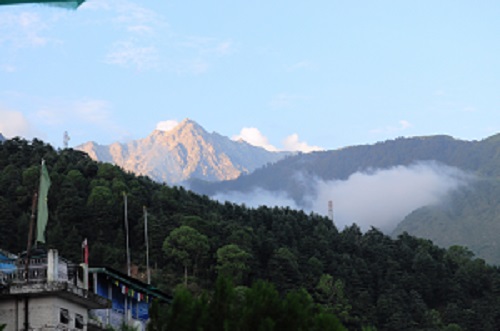Mar 31, 2025
Mar 31, 2025
Zen and the Art of Making a Living by Lawrence G Boldt is a celebrated book that speaks directly to young people and speaks more about professional growth then about Zen as such. But whatever it says about Zen it says meaningfully, powerfully, beautifully.
One of the things it asks us to do is to live free. Live free, live dangerously, live on the edge, live refusing to be tamed, refusing to be bound, says Zen.

Photo by Angha M
One of the names for Zen masters is crazy clouds – crazy because they do not follow social conventions that appear meaningless to them and for that reason they do not look normal to people For instance when everyone works for security and safety, they choose to throw safety and security to the winds and live facing insecurity every moment. For they know that it is in insecurity that we grow, we need the challenges of insecurity for reaching our full maturity, for unfolding all the possibilities within us. They are called clouds because they go wherever the winds of life takes them.
In the days of their greatest growth, when they were world conquerors, Europeans insisted on young people travelling – and facing the dangers and insecurities of travel – before they got married and settled down. A generation or two ago, men like Jack Kerouac wrote books extolling the virtues of the insecurities that travel involves. A secure life is no doubt comfortable but unless you leave your comfort zone, you do not discover your real limits.
One of the wisest men ever to live on this earth said, “Look at the birds of the sky. They neither sow nor reap, nor gather into barns.” That is what we call surrendering to existence and living dangerously. Living on the edge.
I understand that such a life requires more courage than most of us have. But that is what Zen asks us to do. Remember, the original founder of Zen was a prince who lived in rich comforts and securities but decided to leave it all and follow the road, letting it take him where it did. The Katha Upanishad too speaks of the need to choose the road less travelled and not follow blindly the path everyone treads. After all, the teachings of the Upanishads were given to a boy who rejected kingdoms on earth, the highest possible wealth and pleasures beyond the imagination of man.
Boldt says “it’s society’s job to tame the individual and the individual’s job to get free.”
What does free mean? It means freedom to choose and make decisions. About job, about marriage, about the kind of family you will have or to live a life without a job, without marriage or family too, if that is your calling. The right to follow the path one was born for, which ancient India called swadharma, a word that means one’s essential nature, like burning in the case of fire, seeking level in the case of water. It means following what each one us is born for and not following just what society asks us to. I have asked hundreds of bright young boys and girls I taught in some of the top educational institutions of the country if the subject they were studying is the one in which their heart was – and rarely have I received the reply yes, it was. And I have asked officers in scores of corporate houses I have trained if what they were doing was what they wanted to do and I hardly ever have received the answer yes it was. Rather than following their passions, pursuing what they were born for, the vast majority of our students follow professions that are fashionable at the moment and ‘safe’. And after they complete their studies, they take up professions that these studies lead to. This is what Zen speaks of as being bound by society. Freedom would be choosing what one has natural inclinations for, aptitudes for, what one is born for in spite of all pressures on you.
Lawrence Boldt says these in an essay about Bodhidharma, the great Zen master who too was born a prince, who took Zen to China from where it went to Japan, Korea and other places. “It’s about being personally free and socially active. “It is not for wimps. It takes the courage to say no to every attempt to fit you into a category and make you a carbon copy of your next door neighbor. It takes the courage to say no to every attempt to turn you into a beggar, pleading for the approval of others. It takes courage to say no to the needless suffering of your fellow man. No to becoming hypnotized and tranquilized. No to becoming greedy and indifferent. No to becoming clay in somebody else’s hand.”
“Things were no different in Bodhidharma’s day”, adds Boldt. “Society has always been the free man’s greatest enemy. And the free man has always been society’s greatest friend. How did society treat Jesus or Socrates, Galileo or Martin Luther King? Yet look what they have left mankind.”
Cultivate silence of the mind and listen to what your inner depths have to tell you and follow that. Follow the path your inner satisfaction shows you. Contentment is a good guide. Joyfulness is a good guide. When you follow the path you were born for, your life will be filled with joyfulness.
This is because that path will connect you with your true being. And our true being is ananda, joyfulness. And everything we do in life we do seeking ananda.
09-Nov-2019
More by : Satya Chaitanya